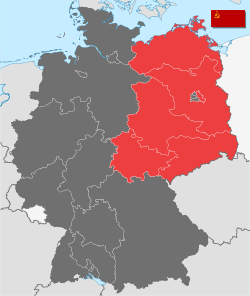Soviet Sector
| Soviet occupation zone of Germany Sowjetische Besatzungszone Deutschlands |
|||||
| Military occupation zone of the Soviet Union part of Allied-occupied Germany | |||||
|
|||||
| Soviet Occupation zone in red. | |||||
| Capital | East Berlin | ||||
| Government | Military occupation | ||||
| Military governors | |||||
| • | 1945–1946 | Georgy Konstantinovich Zhukov (Military commander 8 May 1945 – 9 June 1945) | |||
| • | 1946–1949 | Vasily Danilovich Sokolovsky | |||
| • | 1949 | Vasily Ivanovich Chuikov | |||
| Historical era | Post-World War II Cold War |
||||
| • | Surrender of Nazi Germany | 8 May 1945 | |||
| • | German Democratic Republic established | 7 October 1949 | |||
| • | German reunification | 3 October 1990 | |||
| Today part of |
|
||||
The Soviet Occupation Zone (German: Sowjetische Besatzungszone (SBZ) or Ostzone; Russian: Советская оккупационная зона Германии, Sovetskaya okkupatsionnaya zona Germanii, "Soviet Occupation Zone of Germany") was the area of central Germany occupied by the Soviet Union from 1945 on, at the end of World War II. On 7 October 1949 the German Democratic Republic (GDR), which became commonly referred to as East Germany, was established in the Soviet Occupation Zone.
The SBZ was one of the four Allied occupation zones of Germany created at the end of World War II. According to the Potsdam Agreement, the Soviet Military Administration in Germany (German initials: SMAD) was assigned responsibility for the (present-day) eastern portion of Germany. By the time forces of the United States and Britain began to meet Soviet forces, forming a Line of contact, significant areas of what would become the Soviet zone of Germany were outside Soviet control. After several months of occupation these gains by the British and Americans were ceded to the Soviets, by July 1945, according to the previously agreed upon occupation zone boundaries.
...
Wikipedia


